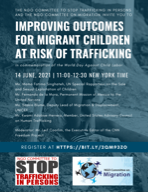“Improving Outcomes for Migrant Children at Risk of Trafficking”
In commemoration of the World Day Against Child Labour 14 June, 2021 | 11:00AM -12:30PM New York Time
Event held virtually on Zoom, Improving Outcomes for Migrant Children at Risk of Trafficking.
An estimated 272 million people, 3.5% of the world’s population, are migrants. Of these, approximately 33 million are children. While most people leave their home countries by choice in search of a better life, millions have been driven away by conflict, violence, persecution, and climate change. The International Organization on Migration’s 2020 World Migration Report estimates there are 31 million children who have been forcibly displaced. According to the International Labour Organization, there are an estimated 152 million children in child labor.
Despite the large numbers of children involved and the legally-binding commitments countries make to protect and promote their well-being as parties to the Convention on the Rights of the Child, in addition to other international agreements, children’s rights and their protection from the risk of recruitment into child labour or sexual exploitation and trafficking are often not national priorities in assisting children on the move. Additionally, all governments have committed, through Agenda 2030, to eliminate child labour (SDG 8.7), to promote safe, orderly and regular migration (SDG 10.7), and to end the trafficking of children (SDG 16.2). Yet, governments frequently prioritize securitized migration enforcement over child protection concerns.
The COVID-19 pandemic has created the perfect storm for vulnerable children at risk as they endeavor to leave their homes in search of better futures, either with their families, or unaccompanied. Fear of the spread of COVID-19 has led to increased barriers to migration, and heightened xenophobia. Exclusion from social protection systems has negatively impacted many migrants ability to take preventative measures against COVID-19 and to receive essential social services. Travel restrictions, closed borders, the suspension of labor migration, the deterioration of situations in detention centers and refugee camps, shortage of supplies and humanitarian workers, and the slowing of migration processing and assistance to asylum seekers have left uncounted numbers of children locked down and in limbo. These numerous obstacles contribute to children’s risk of being trafficked.
Available statistics and data indicate children belong to the population that has suffered the least from the health impacts of COVID-19. However, increased poverty, school closings, and mobility restrictions have intensified the insecurity and vulnerability of most children, which will have both short and long-term socio-economic impacts, including negative impacts on mental health. UNICEF reports that since the pandemic began in early 2020, the number of children living in multidimensional poverty has increased 15% to 1.2 billion. All these factors have exacerbated the situations of migrant and displaced children, already among the most vulnerable in the world to trafficking.
The situation is particularly precarious for migrant girls. Often gender-based violence services have not been considered essential and with reductions in humanitarian aid, according to the Special Rapporteur on the Sale and Sexual Exploitation of Children, there are reports that children are being sold for food and basic supplies, and that children themselves have been forced to engage in sexual activities or child marriage.
In the context of the World Day Against Child Labour, and ahead of the High-Level Political Forum, the NGO Committee on Migration and the Committee to Stop Trafficking in Persons will hold a webinar on June 14th to call attention to the urgent need for prevention of trafficking and forced labour of migrant children. Our expert panel will explore these issues, and provide recommendations to policymakers and other stakeholders.
Speakers:
-
Ms. Mama Fatima Singhateh, UN Special Rapporteur on the Sale and Sexual Exploitation of Children
-
Mr. Fernando de la Mora, Permanent Mission of Mexico to the United Nations
-
Ms. Saskia Blume, Deputy Lead of Migration & Displacement, UNICEF
-
Mr. Kwami Adoboe-Herrera, Member, United States Advisory Council on Human
Trafficking
Moderator: Mr. Leif Coorlim, the Executive Editor of the CNN Freedom Project

